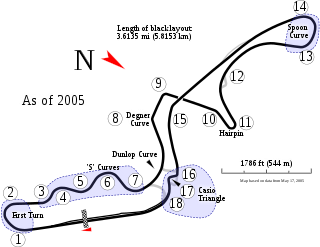
The Suzuka International Racing Course is a motorsport race track located in Ino, Suzuka City, Mie Prefecture, Japan and operated by Mobilityland Corporation, a subsidiary of Honda Motor Co, Ltd. It has a capacity of 155,000.

Group C was a category of motorsport, introduced by the FIA in 1982 for sports car racing, along with Group A for touring cars and Group B for GTs.
The 2003 1000 km of Le Mans was a one-off sports car event run under the organization of the Automobile Club de l'Ouest (ACO) in preparation for the Le Mans Endurance Series that began in 2004. It was run on 9 November 2003 at the Bugatti Circuit near Le Mans, France.

The Japan Le Mans Challenge was an endurance sportscar series based in Japan built around the 24 Hours of Le Mans that began in 2006. It was run by the Sports Car Endurance Race Operation (SERO) sanctioning body and ran under the rules laid out by the Automobile Club de l'Ouest (ACO). It is the first endurance sportscar series in Japan since the demise of the All Japan Sports Prototype Championship in 1992, although the ACO had run a single endurance race since then, the 1999 Le Mans Fuji 1000 km. The series was cancelled in 2007 following two poor seasons.

The Fuji (富士) was a sleeper train that formerly operated between Tokyo and Ōita in Japan. Operated by the Kyushu Railway Company and classified as a limited express service, it was discontinued from the start of the revised timetable on 14 March 2009.
The Fuji Grand Champion Series (富士グランドチャンピオンレース) ran from 1971 to 1989. It was a drivers' championship in Japan and was originally for 2 litre Group B6 cars. The series was started in 1973, and all races were held at the Fuji Speedway circuit.
The 2009 Autobacs Super GT Series was the 16th season of the Japan Automobile Federation Super GT Championship. The season opener on March 22, was moved to Okayama, due to the continued renovation of Suzuka in preparation for the 2009 Japanese Grand Prix. The season finale on November 8 also was moved to Motegi, instead of Fuji. Due to the worldwide economic crisis, race weekends were two days instead of three.

Nils-Kristian "Kris" Nissen is a retired Danish auto racing driver. For several years he was Volkswagen's motorsport director. Since the summer of 2013 he has had a career change and is currently owner and temporary manager of a Danish campingsite called Enderupskov in Southern Jutland.
The JAF Grand Prix (JAFグランプリ) is an auto race held in Japan by the Japan Automobile Federation.

The 6 Hours of Fuji is a sports car race held at Fuji Speedway in Oyama, Shizuoka, Japan. The race was held for the first time in 1967, and in 1977 became part of the new Fuji Long Distance Series. In 1982 a second 1000 km race known as WEC in Japan was run as a round of the World Sportscar Championship. The All Japan Sports Prototype Championship was formed in 1983, and since then co-sanctioned this event. The World Championship left after 1988, but the JSPC carried on both races until 1992. The race was revived in 1999 as an attempt to gauge interest in an Asian Le Mans Series; the series never materialized. The race was revived again as a part of the short-lived Japan Le Mans Challenge in 2007. The race returned again as part of the 2012 FIA World Endurance Championship season, but changed to a 6-hour race, with no distance limit.
The 1992 All Japan Sports Prototype Car Endurance Championship was the tenth and final season of the All Japan Sports Prototype Championship, which would be replaced by the Japan Grand Touring Championship, as sportscar racing in the early 1990s changed drastically with the decline of prototypes. The C1 class champion was the #1 Nissan Motorsports Nissan R92CP driven by Kazuyoshi Hoshino and the C class champion was the #7 and #36 TOM'S Toyota TS010 driven by Geoff Lees.
The Fuji Long Distance Series was a Japanese endurance championship which took place mainly at Fuji International Speedway.
The 1989 Fuji Long Distance Series was the 13th season of this series, with all races being held at the Fuji International Speedway.
The JAF Grand Prix All Japan Fuji 1000 km, was the second round of both the 1989 All Japan Sports Prototype Championship and the 1989 Fuji Long Distance Series was held at the Fuji International Speedway, on the 30 April, in front of a crowd of approximately 58,000.
The 1991 Long Distance Series was the 15th season of this series, with half the races being held at the Fuji International Speedway. This is the first season where races were held away from Fuji, hence the dropping of “Fuji” from the title.
The 2014 Asian Le Mans Series was the third season of the Automobile Club de l'Ouest's Asian Le Mans Series, the fourth 24 Hours of Le Mans-based series created by the ACO, following the American Le Mans Series, the European Le Mans Series and the FIA World Endurance Championship. The four event season began at the Inje Speedium on 20 July 2014 and ended at Sepang International Circuit in Selangor on 7 December 2014.
The 1977 Fuji Long Distance Series was the first season of this series, with all races being held at the Fuji International Speedway.
The 1978 Fuji Long Distance Series was the second season of this series, with all races being held at the Fuji International Speedway.
The 1980 Fuji Long Distance Series was the fourth season of this series, with all races being held at the Fuji International Speedway.





